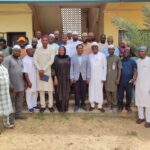By Felicia Imohimi
The Federal Government and the International Fund for Agriculture Development (IFAD), have reiterated commitment to scaling up Information Communications Technology for Development (ICT4D), to empower smallholder farmers.
The programme will unlock potentials in the food systems and engender robust development in agriculture value chains for sustainable food security.
Dr Ernest Umakhihe, Permanent Secretary, Federal Ministry of Agriculture and Rural Development (FMARD), said this on Wednesday in Abuja, at the FGN/IFAD multi-stakeholder Strategic Dialogue on Scaling-up ICT4D, for smallholder farmers in Nigeria.
Umakhihe, represented by Tanimu Ibrahim, Director, Planning in the ministry, said there was need for massive investments in ICT4D to fight against hunger, as well as the inherent food wastage in the value chains.
According to him, this will also widen the gap in adoption of new technologies.
He said mainstreaming ICT4D services in agriculture would also address the significant number of investment gaps, and create farm management solutions in rural areas of low and middle-income earners.
The permanent secretary also said it would find solutions to post-harvest losses and other emerging challenges militating against agriculture development in the country.
“The Nigerian government at all times welcomes technologies and innovations that will aggressively drive the economic diversification of food systems transformation, as well as attainment of export food safety requirement for foreign exchange earnings.
“It is pertinent to know that the widespread use of ICT4D and its importance for innovation and economic growth has been recognised prominently as an easy and convenient fast mode to reach the urban and rural farmers.
“It is aimed as having efficient information on agriculture as a paradigm shift from traditional method of farming to digital economy .”
Umakhihe said the ICT4D programme would largely strengthen National Food and Nutrition Security and National Agriculture Technology and Innovation Policy (NATIP 2023 to 2027) in line with the National Development Plan.
He explained that the NATIP policy aimed at promoting digital technologies was to enhance food systems and create business opportunities for economic growth, employment generation for youths and women, and also wealth creation through the agriculture value chain.
According to him, it will give farmers access to a variety of information sources that they can consult for regular agricultural programmes.
Dr Dede Ekoue, IFAD Country Director, Nigeria, called for unanimous collaboration of all stakeholders in agriculture, finance, information technologies, development partners and farmers among others to harness the full potentials of the programme.
According to Ekoue, such collaborations will make agriculture the economic mainstay of the country.
She said incorporation of ICT4D would assist in addressing the impact of climate change, food security gaps, high food prices, global pandemics, connecting farmers to markets, weak supply chains on food systems, and export supply needs of the country.
Ekoue said the workshop was organised to understand some of the best approaches to scaling up the use of ICT4D solutions for small holders’ farmers to achieve a sustainable and inclusive agri-food system transformation in Nigeria.
She said it would empower smallholder farmers to improve productivity.
“The dialogue on scaling up ICT4D has an agri-food led demand-driven project, aimed at extending digital solutions to farmers, in order to accelerate development on food systems and inject effective response to the far reaching challenges in the supply chains.
“The dialogue is apt and timely, as it prepares farmers to obtain the necessary easy inputs support at the onset of the farming season, where farmers are in need of high-quality agro-services to boost food production and enhance food system resilience,” Ekoue said.
The News Agency of Nigeria (NAN), reports that the dialogue, organised by IFAD, brings together participants from other government departments, the FMARD, Ministry of Communications and Digital Economy, development partners among others.
Other participants are development partners, private sector, youth entrepreneurs, project beneficiaries, and key stakeholders working on digital technology for agriculture. (NAN)(www.nannews.ng)
Edited by Nyisom Fiyigon Dore











